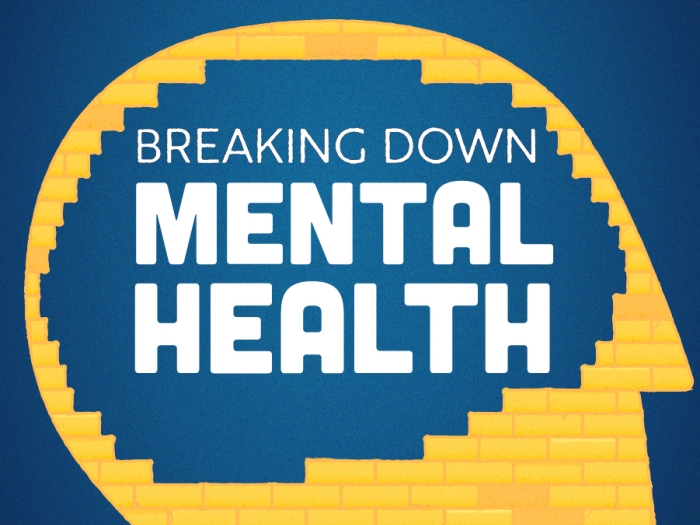Episode 2
Featured guest: Matt Zugel, Patient Rights Officer, U-M Health
Objectives:
- Define what is the metal health code and recipient rights
- Understand the application of the mental health code to psychiatric and medical settings
- Communicate strategies to support psychiatric patients in medical settings
Resources:
- Michigan Legislature Mental Health Code - Act 258 of 1974
- Mental Health Code Excerpt - Rights of Recipients of mental health services (michigan.gov)
CME:
Credits available: 0.50
Visit our CME course overview page for CME credit, or complete this survey for social work CEUs.
Transcript:
Syma Khan:
Hello and welcome to our podcast, Breaking Down Mental Health with myself, social worker, Syma Khan, nurse practitioner, Dr. Christina Cwynar and child and adolescent psychiatrist Dr. Heidi Burns. Today, we are joined by Matt Zugel to discuss a Mental Health Code.
Dr. Heidi Burns:
Matt Zugel obtained his Bachelors of Arts in Behavioral Science from the University of Michigan and his masters in social work from the University of Illinois. He worked briefly as an individual and family therapist for at-risk youth in their families before he took his current role as the recipient rights officer for Washtenaw County Government and is currently seated at Michigan Medicine. He has served in this capacity since 2006. He investigates allegations of violations of the Michigan Mental Health Code, as well as provides education regarding the Mental Health Code and Recipient Rights. Matt has no financial disclosures to share with our audience today. Thank you for joining us for this discussion.
Matt Zugel:
Thank you for having me. I appreciate the invitation.
Dr. Christina Cwynar:
Matt, let's start out very basic here. What is the Mental Health Code and why was it developed?
Matt Zugel:
Great. So the Michigan Mental Health Code is a law that was created back in the 70s, and it's designed to provide guidance on how mental health services are provided in the state of Michigan. The Mental Health Code itself is contained of about 13 different chapters, one of which applies directly to health systems. The others apply mostly to either infrastructure, administration or several of them address how care is provided in a community mental health setting. In the state of Michigan, every county is required to either have a mental health agency or an authority. I actually work for Washtenaw County Mental Health Agency, which is affiliated with the government. The majority of the agencies or authorities in Michigan are not affiliated with their county government. I think Washtenaw is one of either two or three currently that is. The rest of the authorities are not affiliated with a government at all.
The majority of the Mental Health Code again, provides detail about who qualifies for services, how those services are paid for, what services we can and cannot offer the recipient or the patient. And then chapter four, which is specific to the health systems, are designed to again, address the smaller aspects of how care is provided, who pays for them, who qualifies for them, but also the admission and the discharge processes, as well as patients being either committed for involuntary treatment or the patients who choose to admit themselves voluntarily and what that looks like when they are involuntarily committed.
Dr. Christina Cwynar:
Matt, could you tell us a little bit more about the history of the Mental Health Code?
Matt Zugel:
Sure. The Mental Health Code was created back in the 70s to afford additional protections over and above the rights that we all have every day. The reason that the Mental Health Code was created was because the patients back in the 60s and 70s were housed in environments that were not conducive to optimal mental health care. They were abused. They were neglected. Oftentimes, the environments that they were living in were state hospitals or larger group homes where the environment wasn't clean, it wasn't sterile, they were not fed appropriately. They didn't always have power when they were supposed to have it. So the environment that they lived in was less than substantial in order to provide that optimal care.
Dr. Christina Cwynar:
Thank you. It seems like we've come a long way trying to put in safeguards to protect these patients, but also address the stigma around mental health. Because I mean, we all talk to those patients and families who that's their fear when we're sending their child or their loved one to an inpatient unit that that's where we're sending them.
Matt Zugel:
Absolutely. And the type of complaints that generated the creation of the Mental Health Code back in the 70s are different than what the complaints are that I get now. So the environments are different. They're much cleaner. They're much more conducive to providing good mental health care. It's not to say that the state hospitals, of which there are only four now compared to when the Mental Health Code was created, are hotels and motels with pools or anything.
But the type of complaint that I get now, patients are not abused or neglected in the same way. They're treated much more dignified and the types of complaints, although they do happen on occasion. I've been here a long time and I have certainly done a small handful of abuse or neglect allegations. The types of complaints now are typically complaints that have never happened before or happened in different circumstances. So they're not the traditional someone's been hit or neglected to the point where they're physically unwell or malnourished. There are different types of complaints, especially over the last couple of years with COVID and things again that have just never happened before that we have to kind of get used to in a changing environment.
Dr. Christina Cwynar:
Thank you. So we have the Mental Health Code, but we have also been hearing a lot about Recipient Rights recently. So how do these two things fit together?
Matt Zugel:
So Recipient Rights is a chapter and a half of the actual Mental Health Code itself. So the Recipient Rights is what guarantees the patients certain rights under the Mental Health Code that we kind of sometimes take for granted, the right to be treated with dignity, respect, the right to be safe, the right to be a free from abuse, neglect, and to have your treatment information maintained as confidential. Recipient Rights also guarantees that the consumer has the right to receive the services that the professional has identified that they receive. So the Recipient Right process specifically and my job in particular, is kind of broken down into three different components. So there's education, which means that I am required to provide Recipient Right training for all staff who provide a psychiatric service. In Michigan Medicine, we do that annually and then within 30 days of hire for new staff.
The second aspect of that is consultation. So there are a lot of different things that happen for the first time all the time. There are a lot of situations where staff are seeking consultation in order to prevent a right from being violated or to address a situation that's just never happened before. And then lastly is the investigative process. So a complaint has been initiated, a right is alleged to have been violated, and it requires me to do an investigation to determine whether or not that has actually occurred. And then when that does occur, then it requires remediation on the part of the leadership of the hospital to make sure that the type of violation that has happened does not happen again.
Dr. Heidi Burns:
Those of us in psychiatry are quite familiar with the Michigan Mental Health Code and with recipient rights, given that we're part of doing trainings, I think on a yearly basis. But a lot of people outside of psychiatry aren't necessarily as familiar with this. Our team provides consultation to patients and families primarily located in a physical medicine setting. How do aspects of the Mental Health Code differ on a medical unit versus on say, an inpatient psychiatric unit?
Matt Zugel:
Sure. So the biggest difference is that the Mental Health Code does not apply to patients who are outside of the Department of Psychiatry except for very specific circumstances. So if you have a patient whose primary diagnosis is medical in nature and they're housed outside of one of the two inpatient units for psychiatry, then the Mental Health Code is more times than not, not going to apply to them, and Recipient Rights specifically is not going to apply to them. The health system has determined years ago before I started to extend Recipient Right coverage to units that are not obligated to receive it. So the two inpatient units, child and adult, have to be covered by Recipient Rights.
Other units like psych emergency services, ECT, the partial hospitalization program and consultation, as well as the Uptown Center, the Depression Center, the health system back, I think in the year 1999 or 2000, decided to extend coverage to all recipients who were receiving a primary diagnosis of mental health treatment. At that time, and I'm not sure when the consultation services were initiated or when it became a psychiatric component, they decided that if a patient who is receiving a psychiatric service but on a medical floor has a concern or complaint with their solely psychiatric provider, then it would be a Recipient Right issue for me to look into or to follow up with. If a patient who is receiving a psychiatric service on a medical floor has a concern with or complaint about their medical provider, it would be referred to the Office of Patient Relations.
Syma Khan:
Thanks so much, Matt. I think it's an important clarification and important for us to remember that psychiatric patients are a special population and the Mental Health Code and Recipient Rights were developed to promote patient safety and transparency and care. How can healthcare professionals support patients with mental health needs in medical settings?
Matt Zugel:
I think it's important to be familiar with the Mental Health Code, even though it doesn't necessarily apply to the patients that they are serving at that time. I think that it helps break down the stigma. It helps kind of reframe how care is provided when a provider can see through the lens of the patient as opposed to always seeing through the lens of the provider who needs to accomplish specific tasks or to provide that level of care. A lot of patients come in and they are anxious, they're scared, they don't know what's happening to them. They might have a co-occurring medical issue alongside of their psychiatric issue. So being able to kind of reframe what that looks like to the patient from their perspective is going to help create a degree of empathy, I think, from the medical provider.
Speaker 4:
Matt, when you're thinking about a patient, say on a medical unit, are there certain rights that we can limit since they're not in a primary psychiatric setting?
Matt Zugel:
When we extend Recipient Right coverage to those patients, the limitations are how we provide them would be the same. So the majority of rights cannot be limited, freedom from abuse, neglect, dignity, respect, things like that. The categories or the code protected rights that can be limited can be limited regardless of whether they're on an inpatient psych unit or on a consultative service unit. And they would include things like access to a telephone, visitation, internet access, which actually is not a code protected right, but something that we've kind of offered patients historically in the past. Whenever there is a limitation of a right, there has to be an immediate risk of harm to suffer others that would allow us to restrict that right. And when we do restrict a right, currently what we use is what's called a therapeutic plan on the two inpatient units. And those therapeutic plans have four components to it.
The first one being what the limitation was, the second one being what caused the limitation, the third one being like a behavioral component to the plan, meaning that I'm going to, we'll use a phone as an example. The patient was using a phone to call the police or the FBI and harass them. And so the police or the FBI, FBI rather have called back to say, please restrict this person's access, which is appropriate because failing to do that could result in charges being pressed against them for harassment. And then the third element, like I said, would be this behavioral component, meaning maybe I'm going to dial the phone for you. I'm going to hand it back to you. I'm going to supervise your phone call to make sure it's appropriate, and as long as that's okay, then the fourth element is this measurement of time.
So typically the restrictions or the limitations are in place for 24 hours because that's typically when the doctor's orders expire and have to be at least renewed or reviewed. And if the patient is using the phone appropriately after that time, then they do have the right to get their right back as quickly as possible. So making sure that we're meeting the spirit of those four elements as quickly as possible in that therapeutic plan that should be created at the time the limitation is imposed.
Dr. Christina Cwynar:
Now, is there any differences to the Mental Health Code if a patient is pediatric versus an adult?
Matt Zugel:
No, aside from the pediatric patients have the right to receive a mental health services out at an outpatient setting without parental knowledge, which I know is a bit inflammatory. As a parent myself, I can't imagine what that would feel like. But the services that are provided are strictly therapy services. So no medication referrals, no things like drug substance abuse referrals, pregnancy termination referrals, things like that. So that's the only difference for minor patients aside from the rest of the Mental Health Code, which applies to them in the same way, including limitations.
Syma Khan:
So Matt, I know that you're seated at Michigan Medicine. Can you just share a little bit about what are rights offices at other healthcare institutions in the state of Michigan?
Matt Zugel:
Absolutely. So every hospital in the state of Michigan that has an inpatient psychiatric unit is required to have a Recipient Right Officer seated in that hospital. I am one, if not, I believe the only Rights Officer who is employed rather by the county and not directly employed by the hospital, but every CMH, so every community mental health agency also has at least one Rights Officer. So everybody who receives a mental health service within the state of Michigan whose service is funded by public dollars is going to have a Recipient Right Officer available to them.
Syma Khan:
I think that's a really helpful clarification too for any of our clients or consumers or viewers that receive services through community mental health, that there is a support available to them for any kind of clarifications about their services and supports.
Matt Zugel:
And it is specific to both hospitals and CMHs. So if someone was receiving a service in a local provider, so if someone had their own practice, private practice Recipient Rights does not apply to them, and the Mental Health Code does not apply to them. So it has to be somebody who is receiving general fund dollars in order to fund the mental health care that they are getting.
Dr. Christina Cwynar:
Now, this may be a really big question, but how does this differ state by state?
Matt Zugel:
That's a good question. So most states do not have Mental Health Codes, and the ones that do, which are few and far between, do not have the level of infrastructure that Michigan has. So over the course of time that I've been doing this work in the last 15 years, a few other states have moved toward creating a version of their Mental Health Code to try and mimic what Michigan has. So Michigan has been a pioneer in mental health care and providing rights protection, as well as guiding how those services are being delivered for the population of Michigan. So it's kind of stood out as a star amongst all the other states and how to provide that care, and other states look to us for that guidance.
Syma Khan:
Yeah, that's fascinating to learn. I didn't know that.
Matt Zugel:
Absolutely. And a lot of folks that transfer from other health systems outside of Michigan or, and I run into this where other hospitals who become privatized are owned by companies outside of the state of Michigan, are not familiar with the Mental Health Code at all. And then once they buy their local hospital, they're not as enthused with that knowledge to, oh, we have other regulations aside from joint commission or CMS.
Syma Khan:
I think that again, reinforces that the Mental Health Code provides transparency and safeguards for mental health patients.
Matt Zugel:
Absolutely. And it's very prescribed. I mean, the Recipient Rights or the rights that cover the patients are detailed in the Mental Health Code. So it is very specific. If a patient complains about something, it either is a right or it's not, that is covered under the mental health code. So following up and investigating that or coming to some sort of resolution with the infrastructure that the Mental Health Code provides is a fairly easy task for me to help the patient with.
Dr. Christina Cwynar:
Now, if our viewers wanted to learn more about this, is there a resource that we could direct them towards?
Matt Zugel:
The State of Michigan's website mich.gov has the entirety of the Mental Health Code. It is a pretty long document. It's not the most exciting thing to read. So if you're looking for a little late night reading to fall asleep, you would be able to kind of get into the details. And again, chapter four, specific to hospitals and chapter seven and seven A are specific to the Recipient Right process.
Dr. Christina Cwynar:
Do you have any other thoughts that you would like to share with our audience?
Matt Zugel:
Just that I've been in this role for quite some time, and I've always encouraged providers, regardless of what service they're providing the patient to use the Rights Office as a consultative tool to be a resource for them and not to be afraid. I know a lot of folks get kind of nervous like, oh, here comes Matt Zugel. We better watch out. And I don't care for that. Right. So it's not my job to get anyone in trouble. It's certainly not my job to get anyone fired or anything like that. It's my philosophy that I'd much rather provide that consultation and be proactive to address a problem before it actually becomes a complaint where there is an investigation. And if I can do that and be part of the team process and say that, how can I help you do what you want to do in order to prevent any kind of complaint or allegation being made, then I'm happy to do that and I'd much rather do that.
I think that sometimes it's easy to kind of see the Recipient Right Office as a barrier to care, or the Mental Health Code is to some sort of impediment when you are trying to provide a certain service. And I can understand why sometimes people believe that to be true. But I will say that there are times where even though I might have to say, no, we can't do something this way, I'm more than happy to figure out another way to do it in order for you to accomplish what you're trying to accomplish with the patient. Sometimes it's the simple as saying, we can't do it this way, but we can do it another way and then work together to figure that out and honor the spirit of Recipient Rights as well as accomplish what the staff want to accomplish.
Dr. Heidi Burns:
Thank you, Matt. I think it's important to remember the history of psychiatric care in the United States and what the purpose is of the Michigan Mental Health Code and kind of what we're trying to fix and move away from, and trying to treat a person as a whole individual. So I think this is really important. So thank you so much.
Matt Zugel:
Absolutely.
Dr. Heidi Burns:
And thank you everyone who tuned in this week. Nurses, social workers, and physicians can claim CMEs or CEUs by visiting uofmhealth.org/breakingdownmentalhealth.
Dr. Christina Cwynar:
You're able to do this anytime within three years of the initial air date.
Dr. Heidi Burns:
We hope that you will join us next time.

Listen to more Breaking Down Mental Health podcasts - a part of the Michigan Medicine Podcast Network.





